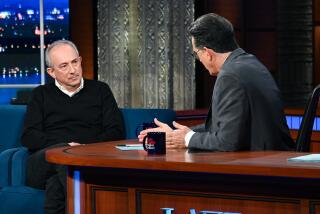Claimants Lose Bid to Crack ‘Da Vinci Code’
- Share via
LONDON — A British High Court judge ruled Friday that author Dan Brown was not guilty of plagiarism in writing his bestselling novel “The Da Vinci Code.”
Judge Peter Smith, pronouncing his verdict in packed courtroom No. 61, dismissed the claim that Brown’s novel “appropriated the architecture” and central themes of a 1982 work written by the plaintiffs.
The three-week trial, which saw Brown take the witness stand, attracted huge publicity and at times became a real-life potboiler followed by readers and writers alike.
Michael Baigent and Richard Leigh, who with Henry Lincoln wrote “The Holy Blood and the Holy Grail,” had accused Brown of borrowing from their nonfiction book and lifting their theory that Jesus Christ and Mary Magdalene married and that their bloodline survived.
Smith ruled that although the language in the two works showed some copying by Brown from the text of the 24-year-old book, it did not amount to copyright infringement.
In their suit, Baigent and Leigh set out a 15-point analysis of what they called the central themes of “The Holy Blood and the Holy Grail,” noting their work argued that Jesus Christ as a Jew would have married and had offspring, and that after his crucifixion, Mary Magdalene fled the Holy Land for France, where their descendants founded the Merovingian dynasty. Its kings ruled parts of France and Germany from the 5th to 8th centuries.
In his 71-page judgment, Smith said that even if there were central themes to the claimants’ book, “it is merely an expression of a number of facts and ideas at a very general level.” Theirs was historical conjecture rather than original work, he wrote, adding that the points raised by Baigent and Leigh were “artificially taken out of [their book] for the purpose of the litigation.”
The claimants were ordered to pay 85% of the legal expenses incurred by Brown’s publisher, Random House. The first payment of $600,000 toward the fee, which could top $1.75 million, is due by the end of the month.
Smith’s ruling erased fears that an adverse decision could severely damage Brown’s reputation and delay next month’s release of a multimillion-dollar film of “The Da Vinci Code” starring Tom Hanks.
The trial, closely followed by media and the book world, was seen as a landmark literary case. The verdict appeared to produce a collective sigh of relief among novelists who use historical reference books for their works of fiction.
Brown, whose book has sold 40 million copies, did not attend Friday’s court session but issued a statement.
“Today’s verdict shows that this claim was utterly without merit,” he said. “I’m still astonished that these two authors chose to file their suit at all.”
Random House Chief Executive Gail Rebuck, speaking to reporters outside the Gothic-style Royal Courts of Justice, applauded the verdict.
“We are pleased that justice and common sense have prevailed,” she said. “We never believed this case should have come to court, something which we have tried to explain to the claimants on many occasions.
“Copyright law exists to strike a fair balance between protecting authors’ rights on the one hand and allowing creative freedom -- literary freedom if you like -- on the other,” she added. “Happily today’s judgment ensures that novelists will remain free to draw on ideas and historical research for their work.”
Leigh denied that he and Baigent had suffered complete defeat. “I think by its very nature this case entailed a conflict between the spirit of the law and the letter of the law,” he said outside the court. “We lost on the letter of the law, I think we won on the spirit of the law, and to that extent we feel vindicated.”
In his testimony, Brown acknowledged that “The Holy Blood and the Holy Grail” was among the works that he and his wife, Blythe, looked at when doing research for “The Da Vinci Code.”
Brown said he had acknowledged the work in his book, using an anagram of the authors’ names for the character of Leigh Teabing, and directly referring to it in his novel. “I went out of my way to mention them for being the ones who brought the theory to mainstream attention,” he said.
In a way, the three authors can feel vindicated by the case: Sales of both books have rocketed. BBC radio is broadcasting excerpts from “The Holy Blood and the Holy Grail” this week, and Sony Pictures, which was not a party in the lawsuit, said it welcomed the results. The film version of “The Da Vinci Code” will be released in the U.S. and Britain as planned May 19.
More to Read
Sign up for our Book Club newsletter
Get the latest news, events and more from the Los Angeles Times Book Club, and help us get L.A. reading and talking.
You may occasionally receive promotional content from the Los Angeles Times.









